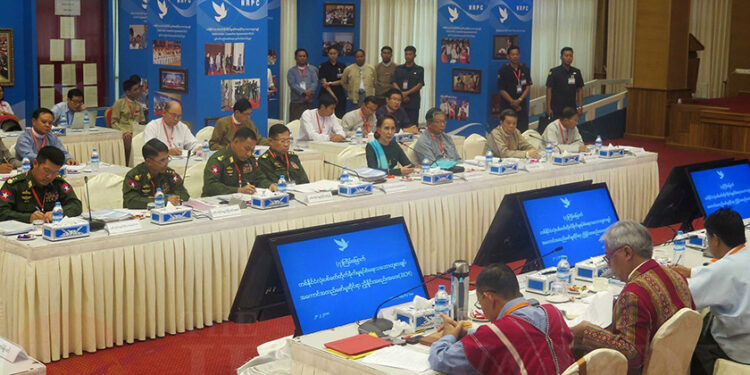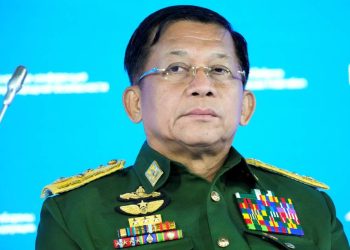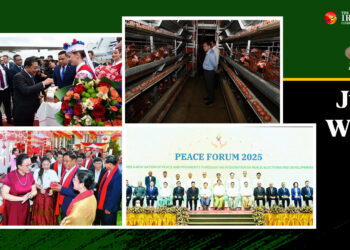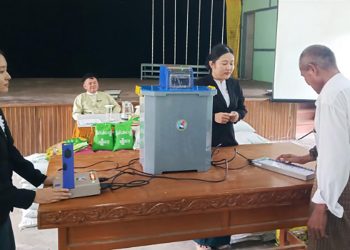CHIANG MAI, Thailand — Due to the delay in convening national level dialogues, the planned third session of the 21st-Century Panglong Union Peace Conference (UPC) has been moved to early May.
The tentative date was agreed at the Joint Implementation Coordination Meeting (JICM) on Wednesday, according to U Zaw Htay, a spokesman for the State Counsellor’s Office.
The government’s initial plan was to hold a session of the peace conference every six months, but the meetings have fallen behind schedule, with the last one held in May 2017.
Ethnic-based national-level dialogues have not yet been held in conflict-torn Rakhine and Shan states.
The New Mon State Party (NMSP), which recently signed the Nationwide Ceasefire Agreement, will hold the Mon National Dialogue in Yay Township, said Dr. Salai Lian Hmung Sakhong, vice chairman of the Union Peace Dialogue Joint Committee (UPDJC).
Nai Aung MaNge, a central committee member of the NMSP, told The Irrawaddy that the Mon National Dialogue will be held on March 23, after public consultations at five venues in areas under its control in Kawkareik and KyarInn Seik Gyi townships in Karen State and Yay Township and Three Pagoda Pass in Mon State.
In January, the Restoration Council of Shan State (RCSS) canceled the planned Shan National Dialogue after the Myanmar military (or Tatmadaw) obstructed the holding of public consultations. The government supported the Tatmadaw’s actions.
U Zaw Htay said the UPDJC are discussing with the RCSS how to move forward. It has held 14 public consultations but has yet to hold the national dialogue (ND) in Longkho as it has five more consultations to conduct, in Taungyi, Kyauk Mae, Karli and Panglong townships in Shan State, and Mandalay.
On Tuesday, the UPDJC discussed possible approaches that the RCSS could take to conducting the ND, which is considered the key mechanism for gathering public recommendations to share at the UPC. U Zaw Hay said the government is awaiting a response.
According to Dr. Salai Lian Hmung Sakhong, the UPDJC has come up with two options for the RCSS to be able to convene the national-level dialogue. He did not provide details, but said the RCSS representatives would share the options with the organization’s leadership and submit a response. “So we hope the current deadlock with RCSS will be broken and we can move forward,” he said.
The Arakan Liberation Party, an NCA signatory, proposed holding its public consultations in Kyauk Phyu, Mrauk-U, Taunggup and Sittwe in Rakhine State, and in Yangon, U Zaw Htay said. “Because of the Rakhine State situation, we are not able to do it, even though the government, Tatmadaw and the Parliament gave their consent, and both UPDJC and JICM have agreed to conduct the ND in Rakhine. But we will keep trying our best,” he told the reporters on Wednesday in Naypyitaw.
Stick to the deal, Tatmadaw says
The peace process is stalled due to a lack of adherence to the decisions agreed between the government, Tatmadaw and the ethnic armed organizations (EAOs), said Vice Senior General Soe Win, the deputy commander-in-chief of the Tatmadaw, on Wednesday.
He made the remarks while delivering the opening speech at the 7th JICM held at Naypyitaw’s National Reconciliation and Peace Center.
The Tatmadaw deputy chief urged each signatory “to strictly follow the decisions” the parties have made together. He was referring to the terms of reference drafted and approved by all sides.
Vice Sen-Gen Soe Win said, “There was a misunderstanding, as there is no description of a prior-public consultation [process] in the decision made at the meeting. Thus the process has stalled and dragged on. If we just follow our JICM decisions, the issues will be solved.”
He referred specifically to the cancelled Shan national-level dialogue led by the Restoration Council of Shan State (RCSS) in January, following the Tatmadaw’s obstruction of the Shan public consultation process. At the last JICM meeting in November 2017, the decision to hold the Shan ND in Longkho (Linkhay) Township was made as the Tatmadaw opposed holding the talks in the Shan State capital, Taunggyi.
The Tatmadaw insisted there is no need to hold prior public consultations before the national-level political dialogues, pointing out that in the government-led dialogue process, participants shared their thoughts at the regional level without first holding prior consultations.
The EAOs have said the smaller prior public consultations are a crucial means of including local people’s views, as the smaller consultations allow contact with the public and an opportunity to listen to their concerns and perspectives on federal Union-building.
The RCSS has already said that their public consultations are in accordance with the bilateral agreement and with a “gentlemen’s agreement” on the process, adding that the prior national-level dialogues in Karen, PaO and Chin were done after holding public consultations.
Negotiations have faced setbacks and deadlocks due to the Tatmadaw’s rigid stand on its six-point principles for the peace process and reluctance to allow public gatherings in ethnic states. The military commanders insist that the stakeholders follow their orders, instead of negotiating.
More delegates to NCA bodies
As there are now 10 EAOs that have signed the NCA, leaders at Wednesday’s JICM decided that nine EAOs would be JICM representatives, excluding the Lahu Democratic Union (LDU), given its lack of military power. LDU leaders on Wednesday joined JICM as observers, according to JICM representatives.
Dr. Salai Lian Hmung Sakhong, vice chairman of the UPDJC, said both the LDU and NMSP had become full members of the UPDJC and could participate in its working committees.
The number of UPDJC members will be unchanged, as it has 16 members each from the government (including the Tatmadaw and lawmakers), EAOs and political parties. Seats are reserved for the 16 government-recognized ethnic armed groups.
In addition, Dr. Aye Maung, a UPDJC member from the Arakan National Party (ANP) — one of 16 members representing political parties — who is now detained and standing trial, was replaced by U Oo Hla Saw, a lawmaker representing the ANP. Dr. Aye Maung is also an Upper House lawmaker from Ann constituency. He won the by-election in April 2017.
State Counsellor Daw Aung San Suu Kyi, delivering the opening speech to the JICM, said both sides’ armed forces need to listen to the government so that the government can act as a negotiator between them.
She urged senior decision-makers to join the talks and “to thoroughly discuss” the issues, noting that the chairmen of the KNU and RCSS were not present at the JICM, while KNU/KNLA-Peace Council secretary Dr. Naw Kapaw Htoo was absent due to illness.
KNU chairman Padoh Saw Mutu Say Poe is also ill, which is why he could not attend, according to KNU general secretary Padoh Saw Tadoh Moo.
Accord No. 1 approved
The government sought Parliament’s approval of the number of EAO signatories rising to 10, as Parliament approved the text of the NCA in late 2015.
Attorney General U Tun Tun Oo, a member of the NRPC, explained to Parliament the recent progress on the NCA, and the lawmakers gave their approval of the new signatories.
In addition, the Union Parliament on Feb. 28 also approved the 37 basic principles toward building a federal Union (Union Accord No. 1) at its session, nine months after it was signed at the second session of the UPC in May last year.
At that meeting, when the EAOs established a set of basic principles, not all groups fully gave their consent, as they were not in line with federal principles such as autonomy and the right to draft state constitutions. Rather, it was merely a facsimile of the Union’s current 2008 Constitution; that meeting also did not include the views of the Mon and Lahu, and they had not consented to Union Accord No. 1 (or the first part of the Union Accord).
“We have not been able to discuss the issue during the JICM,” said Nai Aung MaNge, adding that this was because the talks mainly focused on efforts to convene the UPC and set a date. “We hope the challenges will be overcome through the talks,” he said.
Htet Naing Zaw contributed to this report from Naypyitaw.

















